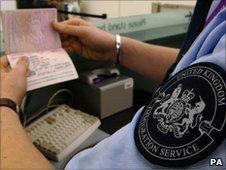Migration settlement rights to be cut says Home Office
- Published

Proposals to cut the number of migrants allowed to settle permanently in the UK have been published by the Home Office.
In future, only a "tightly controlled minority" from outside the European Union will be allowed to stay for more than five years.
Ministers say they are also considering stopping wealthy business people staying on after five years.
The move is part of the government's pledge to cut net migration to tens of thousands by the end of the Parliament.
Ministers have already announced an immigration cap affecting skilled workers from outside the European Union and plans to restrict students.
The government also says dependants of visa applicants may have to pass an English test.
In a written parliamentary statement, Immigration Minister Damian Green said: "We intend to break the automatic link between coming to the UK to work and settling here permanently.
"In 1997, there were fewer than 10,000 employment-related grants of settlement; by 2010, that number had risen to over 84,000.
"We need to be more selective about who we allow to stay."
The key proposals in the 12-week consultation include only allowing temporary residence for skilled workers, ending the assumption that anyone who comes to the UK can ask to stay after five years.
However, ministers say they could make exceptions for workers earning more than £150,000 or if they were in eocnomically important jobs.
Another proposal is to ban non-EU domestic workers - people who work in private homes in jobs including cooks and nannies.
The government is also considering limiting the rights of wealthy entrepreneurs or highly-qualified business people to settle.
'Disruption' warning
Adam Marshall of the British Chambers of Commerce warned the policy could backfire.
"Britain's migration system must protect our economy as well as our borders," said Dr Marshall.
"Turfing out valuable migrant workers who are turned down for settlement would be incredibly disruptive to companies of all sizes and to the UK's economic recovery.
But Sir Andrew Green of pressure group Migrationwatch UK said: "We think this is exactly the right approach. We have to strike a balance between the needs of industry and the need to get the numbers down.
"Clearly employers need skilled labour from overseas but in principle our view is that should be temporary, while British workers are trained for those jobs."
But Scott Blinder of Oxford University's Migration Observatory expert group told BBC Radio 5Live: "We won't really see much of an impact [in this policy] on the government's ambitions to cut net migration by the end of the Parliament.
"There are broader forces that create demand among employers for migrant labour.
"[The proposed changes] may end up squeezing one end of the balloon and the other pops up - it's not a given that departing [non-EU skilled workers] will be replaced by British workers."
Shadow Home Office Minister Shabana Mahmood said: "We support reform in this area, which is why the Labour Government introduced tough changes to the settlement regime through our policy of Earned Citizenship. Unfortunately the Government abandoned this work. .
"However, changes to the settlement regime are only effective if they are backed up by strong and consistent enforcement of the rules. The Government has imposed a 20% cut on the UKBA budget, which will mean the loss of over 5000 jobs. It is inevitable that enforcement will suffer as a result."
- Published23 November 2010
- Published9 June 2010